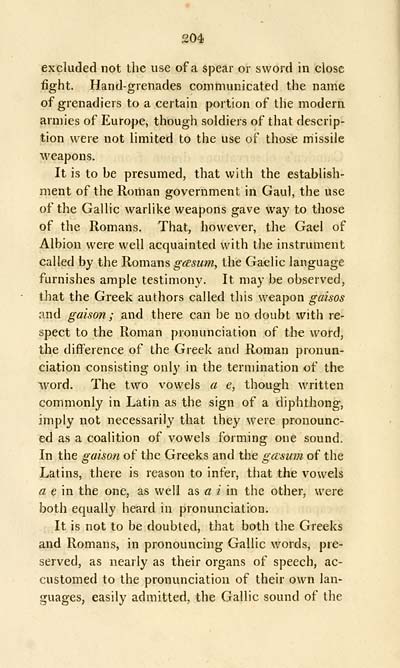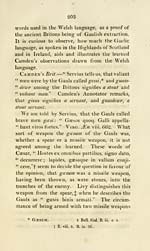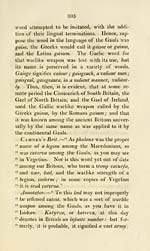Download files
Complete book:
Individual page:
Thumbnail gallery: Grid view | List view

$0^
excluded not the use of a spear or sword in close
fight. Hand-grenades communicated the name
of grenadiers to a certain portion of the modern
armies of Europe, though soldiers of that descrip-
tion were not limited to the use of those missile
weapons.
It is to be presumed, that with the establish-
ment of the Roman government in Gaul, the use
of the Gallic warlike weapons gave way to those
of the Romans. That, however, the Gael of
Albion were well acquainted with the instrument
called by the Romsins gas urn, the Gaelic language
furnishes ample testimony. It may be observed,
that the Greek authors called this weapon gaisos
and gaisoti ; and there can be no doubt with re-
spect to the Roman pronunciation of the word,
the difference of the Greek and Roman pronun-
ciation consisting only in the termination of the
word. The two vowels a e, though written
commonly in Latin as the sign of a diphthong,
imply not necessarily that they were pronounc-
ed as a coalition of vowels forming one sound.
In the gaison of the Greeks and the gcesum of the
Latins, there is reason to infer, that the vowels
a e\n the one, as well as a i in the other, were
both equally heard in pronunciation.
It is not to be doubted, that both the Greeks
and Romans, in pronouncing Gallic words, pre-
served, as nearly as their organs of speech, ac-
customed to the pronunciation of their own lan-
guages, easily admitted, the Gallic sound of the
excluded not the use of a spear or sword in close
fight. Hand-grenades communicated the name
of grenadiers to a certain portion of the modern
armies of Europe, though soldiers of that descrip-
tion were not limited to the use of those missile
weapons.
It is to be presumed, that with the establish-
ment of the Roman government in Gaul, the use
of the Gallic warlike weapons gave way to those
of the Romans. That, however, the Gael of
Albion were well acquainted with the instrument
called by the Romsins gas urn, the Gaelic language
furnishes ample testimony. It may be observed,
that the Greek authors called this weapon gaisos
and gaisoti ; and there can be no doubt with re-
spect to the Roman pronunciation of the word,
the difference of the Greek and Roman pronun-
ciation consisting only in the termination of the
word. The two vowels a e, though written
commonly in Latin as the sign of a diphthong,
imply not necessarily that they were pronounc-
ed as a coalition of vowels forming one sound.
In the gaison of the Greeks and the gcesum of the
Latins, there is reason to infer, that the vowels
a e\n the one, as well as a i in the other, were
both equally heard in pronunciation.
It is not to be doubted, that both the Greeks
and Romans, in pronouncing Gallic words, pre-
served, as nearly as their organs of speech, ac-
customed to the pronunciation of their own lan-
guages, easily admitted, the Gallic sound of the
Set display mode to: Large image | Transcription
Images and transcriptions on this page, including medium image downloads, may be used under the Creative Commons Attribution 4.0 International Licence unless otherwise stated. ![]()
| Early Gaelic Book Collections > Ossian Collection > Thoughts on the origin and descent of the Gael > (216) |
|---|
| Permanent URL | https://digital.nls.uk/82237036 |
|---|
| Description | Selected books from the Ossian Collection of 327 volumes, originally assembled by J. Norman Methven of Perth. Different editions and translations of James MacPherson's epic poem 'Ossian', some with a map of the 'Kingdom of Connor'. Also secondary material relating to Ossianic poetry and the Ossian controversy. |
|---|
| Description | Selected items from five 'Special and Named Printed Collections'. Includes books in Gaelic and other Celtic languages, works about the Gaels, their languages, literature, culture and history. |
|---|

